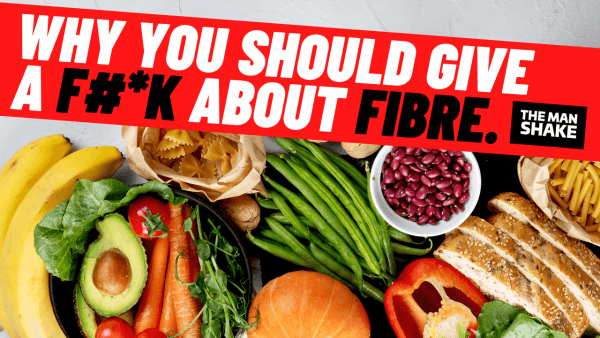
Why you should give a F#*k about Fibre.
Share
Fibre is not exciting, fun or sexy but it's incredibly important.
To put it basically you can't actually digest it but it ends up in your colon to help the good bacteria do a number of complicated things to keep you healthy.
The best part is that certain types of fibre can help with weight loss, lowering blood sugar levels and fight constipation (you're gonna need it on a high protein diet) Source
Now the fancy people of The Academy of Nutrition and Dietetics says we should be having about 14 grams of fibre for every 1,000 calories per day. So it works out at roughly 24 grams of fibre for women and 38 grams for men (source)
The good news is increasing your daily fibre intake is pretty easy — simply integrate high fibre foods into your diet.
Fibre is a pretty broad term that applies to any type of carb that your body can’t digest. The point is your body doesn’t use fibre for fuel doesn’t make it less valuable to your overall health.
Let's have a look at them.
If increasing your fibre intake is the only dietary change you make, you'll drop kilos.
People who were told to get at least 30 grams of fibre a day, but given no other dietary directions, lost a significant amount of weight, found a recent study in the Annals of Internal Medicine.
Fibre-rich foods not only fill you up faster and keep you satisfied longer, but they also prevent your body from absorbing some of the calories in the foods you eat.
The best bit is that if you're already on The Man Shake program then you are getting a massive 7.5g per serving so at 2 shakes per day.
That is close to half your RDI in 2 meals!
#winning
Yep, it can also help you avoid putting kegs back on.
People who got more fibre tended to be lighter overall-while those who were obese got an average of almost 1 gram a day less fibre than normal-weight participants, according to a study at the Medical University of South Carolina.
And recent research at Georgia State University found that mice put on diets lacking in fibre-specifically soluble fibre-gained weight and had more body fat compared with those who weren't deficient.
It's a well-established fact.
A recent analysis of 19 studies, for example, found that people who ate the most fibre-more than 26 grams a day-lowered their odds of the disease by 18 per cent, compared to those who consumed the least (less than 19 grams daily).
The researchers believe that it's fibre's one-two punch of keeping blood sugar levels steady and keeping you at a healthy weight that may help stave off the development of diabetes.
If your gut isn't happy then your brain and mood won't be too far behind it.
It's has been proven that your gut is the second brain and can have adverse effects on your mental health but your mood too. There are two armies of bacteria in your gut, Good Vs Evil.
The good bugs feed off fibre and flourish. As your gut bacteria eats up fibre that has fermented in your G.I. tract (Yum).
They produce short-chain fatty acids that have a host of benefits-including lowering systemic inflammation, which is linked to obesity and nearly every major chronic health problem.
You've got to consistently get enough grams-ideally every day, if not most days of the week too keep getting the benefits.
Researchers at the Harvard School of Public Health recently found that people who often ate fibre-rich breakfasts had a 19 and 17 per cent, reduced risk of death-from any cause-compared to those who had less fibre-heavy meals.
Giggle all you want, but constipation is a common contributor to diet changes (trust us) and you don't need us to tell you it's no fun. we want to keep it super simple because fibre makes your poop softer and bulkier-both of which speed its way from your body.
Most people don’t meet the recommended daily intake of 25 grams for women and 38 grams for men.
High Fibre foods
To put it basically you can't actually digest it but it ends up in your colon to help the good bacteria do a number of complicated things to keep you healthy.
The best part is that certain types of fibre can help with weight loss, lowering blood sugar levels and fight constipation (you're gonna need it on a high protein diet) Source
Now the fancy people of The Academy of Nutrition and Dietetics says we should be having about 14 grams of fibre for every 1,000 calories per day. So it works out at roughly 24 grams of fibre for women and 38 grams for men (source)
The good news is increasing your daily fibre intake is pretty easy — simply integrate high fibre foods into your diet.
Fibre is a pretty broad term that applies to any type of carb that your body can’t digest. The point is your body doesn’t use fibre for fuel doesn’t make it less valuable to your overall health.
Let's have a look at them.
You'll lose weight.
Now we are talking!If increasing your fibre intake is the only dietary change you make, you'll drop kilos.
People who were told to get at least 30 grams of fibre a day, but given no other dietary directions, lost a significant amount of weight, found a recent study in the Annals of Internal Medicine.
Fibre-rich foods not only fill you up faster and keep you satisfied longer, but they also prevent your body from absorbing some of the calories in the foods you eat.
The best bit is that if you're already on The Man Shake program then you are getting a massive 7.5g per serving so at 2 shakes per day.
That is close to half your RDI in 2 meals!
#winning
Maintain a Healthier Weight Over Time
Yep, it can also help you avoid putting kegs back on.
People who got more fibre tended to be lighter overall-while those who were obese got an average of almost 1 gram a day less fibre than normal-weight participants, according to a study at the Medical University of South Carolina.
And recent research at Georgia State University found that mice put on diets lacking in fibre-specifically soluble fibre-gained weight and had more body fat compared with those who weren't deficient.
Cut Your Type 2 Diabetes Risk
It's a well-established fact.
A recent analysis of 19 studies, for example, found that people who ate the most fibre-more than 26 grams a day-lowered their odds of the disease by 18 per cent, compared to those who consumed the least (less than 19 grams daily).
The researchers believe that it's fibre's one-two punch of keeping blood sugar levels steady and keeping you at a healthy weight that may help stave off the development of diabetes.
Happy Gut
If your gut isn't happy then your brain and mood won't be too far behind it.
It's has been proven that your gut is the second brain and can have adverse effects on your mental health but your mood too. There are two armies of bacteria in your gut, Good Vs Evil.
The good bugs feed off fibre and flourish. As your gut bacteria eats up fibre that has fermented in your G.I. tract (Yum).
They produce short-chain fatty acids that have a host of benefits-including lowering systemic inflammation, which is linked to obesity and nearly every major chronic health problem.
You've got to consistently get enough grams-ideally every day, if not most days of the week too keep getting the benefits.
Live Longer, Period
Researchers at the Harvard School of Public Health recently found that people who often ate fibre-rich breakfasts had a 19 and 17 per cent, reduced risk of death-from any cause-compared to those who had less fibre-heavy meals.
Be More, Well, Regular
Giggle all you want, but constipation is a common contributor to diet changes (trust us) and you don't need us to tell you it's no fun. we want to keep it super simple because fibre makes your poop softer and bulkier-both of which speed its way from your body.
Most people don’t meet the recommended daily intake of 25 grams for women and 38 grams for men.
High Fibre foods
- The Man Shake - 7.5g per serve
- Chia seeds - 34.4g per 100g
- Dark Chocolate - 10.9 per 100g
- Avocado - 6.7g per 100g
- Raspberries - 6.5g per 100g
- Artichoke - 5.4g per 100g
- Lentils - 7.3g per 100g
- Split peas - 8.3g per 100g
- Chick peas - 7g per 100g
- Popcorn - 14.4g per 100g
- Almonds - 13.3g per 100g






